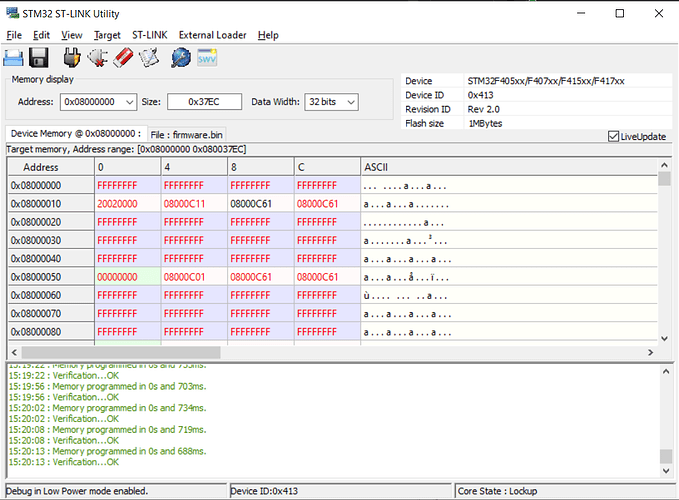Hello,
I’m trying to run Arduino code on a VESC 4.12 which uses an STM32F405RG. I am using the genericSTM32F405RG board option. Here is the hardware schematic: https://github.com/vedderb/bldc-hardware/blob/master/design/BLDC_4.pdf?raw=true I am using an ST-Link v2 for uploading and debugging.
I haven’t been able to achieve anything that demonstrates my code is running, though it uploads without error. A blink program using either PC4 or PC5, where LEDs are connected, does not blink LEDs, and running with the PIO_FRAMEWORK_ARDUINO_ENABLE_CDC build flag does not cause USB to enumerate. When I try to debug either one of two issues occur. 1) the program seems to start running and then stops on one instruction and PC doesn’t seem to increment, or 2) I get the error “openocd: /Host/home/ilg/Work/openocd-0.10.0-13/openocd.git/src/flash/nor/stm32f2x.c:1205: stm32x_probe: Assertion `(bank->size >> 10) == flash_size_in_kb’ failed.” when it tries to launch the debugging session. I’m not sure why stm32f2x.c is being used as the project is for an f4x. I’m not sure why that assertion fails sometimes and not others. Here is the full output from the debug console:
Processing genericSTM32F405RG (platform: ststm32; board: genericSTM32F405RG; framework: arduino)
--------------------------------------------------------------------------------
Verbose mode can be enabled via `-v, --verbose` option
CONFIGURATION: https://docs.platformio.org/page/boards/ststm32/genericSTM32F405RG.html
PLATFORM: ST STM32 7.0.0 > STM32F405RG (128k RAM. 1024k Flash)
HARDWARE: STM32F405RG 168MHz, 128KB RAM, 1MB Flash
DEBUG: Current (stlink) External (blackmagic, jlink, stlink)
PACKAGES:
- framework-arduinoststm32 4.10900.200602 (1.9.0)
- framework-cmsis 2.50501.200527 (5.5.1)
- toolchain-gccarmnoneeabi 1.90201.191206 (9.2.1)
LDF: Library Dependency Finder -> http://bit.ly/configure-pio-ldf
LDF Modes: Finder ~ chain, Compatibility ~ soft
Found 15 compatible libraries
Scanning dependencies...
No dependencies
Building in debug mode
Checking size .pio/build/genericSTM32F405RG/firmware.elf
Advanced Memory Usage is available via "PlatformIO Home > Project Inspect"
RAM: [ ] 0.7% (used 856 bytes from 131072 bytes)
Flash: [ ] 0.8% (used 8820 bytes from 1048576 bytes)
========================= [SUCCESS] Took 3.61 seconds =========================
Reading symbols from /home/levi/Documents/PlatformIO/Projects/vesc_test/.pio/build/genericSTM32F405RG/firmware.elf...
PlatformIO Unified Debugger -> http://bit.ly/pio-debug
PlatformIO: debug_tool = stlink
PlatformIO: Initializing remote target...
xPack OpenOCD, 64-bit Open On-Chip Debugger 0.10.0+dev (2019-07-17-11:25)
Licensed under GNU GPL v2
For bug reports, read
http://openocd.org/doc/doxygen/bugs.html
hla_swd
Info : The selected transport took over low-level target control. The results might differ compared to plain JTAG/SWD
Info : tcl server disabled
Info : telnet server disabled
Info : clock speed 2000 kHz
Info : STLINK V2J37S7 (API v2) VID:PID 0483:3748
Info : Target voltage: 3.163636
Info : stm32f4x.cpu: hardware has 6 breakpoints, 4 watchpoints
Info : accepting 'gdb' connection from pipe
Info : device id = 0x10076413
Info : flash size = 8194 kbytes
openocd: /Host/home/ilg/Work/openocd-0.10.0-13/openocd.git/src/flash/nor/stm32f2x.c:1205: stm32x_probe: Assertion `(bank->size >> 10) == flash_size_in_kb' failed.
Aborted (core dumped)
.pioinit:13: Error in sourced command file:
Remote connection closed
Here is my platformio.ini:
[env:genericSTM32F405RG]
platform = ststm32
board = genericSTM32F405RG
framework = arduino
upload_protocol = stlink
debug_tool = stlink
I updated the firmware on my ST-Link. Any ideas what the issue is? Any help is appreciated. Thanks.
